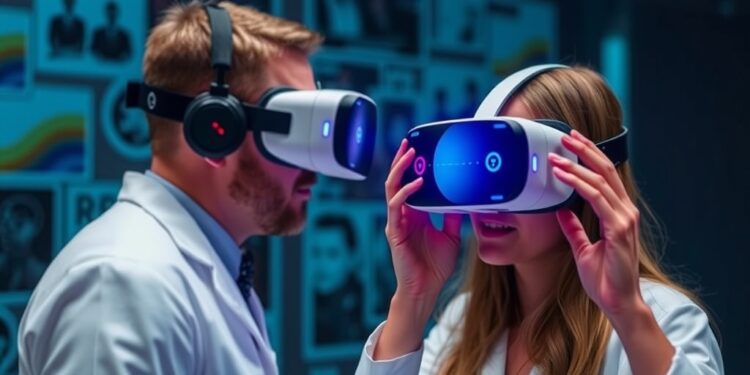Researchers have made significant strides in the field of psychiatric diagnosis with the introduction of a novel virtual reality-based system aimed at enhancing the differentiation between various mental health conditions. This groundbreaking work, presented in the March edition of the peer-reviewed journal European Neuropsychopharmacology, has the potential to revolutionize the way clinicians assess and treat patients suffering from mental health issues. Traditionally, accurate diagnostic processes in psychiatry have been fraught with challenges, with a major concern being the frequent misdiagnosis of patients. Over 50% of individuals receiving psychiatric care have reported a change in their diagnosis within a ten-year span. This phenomenon primarily stems from the overlap of symptoms across numerous mental health disorders, making it exceedingly complicated to discern one condition from another.
Many common mental health conditions, such as schizophrenia and bipolar disorder, share similar characteristics, including apathy, hallucinations, and cognitive impairments. Such symptom overlap can lead clinicians to mistakenly classify a patient’s disorder, thereby resulting in inadequate treatment plans. The ramifications of misdiagnosis are extensive, often culminating in suboptimal therapeutic interventions that can hinder patient recovery and long-term outcomes. Addressing these issues, a dedicated team of scientists from Denmark has embarked on a quest to unveil a more objective method for psychiatric diagnosis through the integration of virtual reality technology alongside physiological measurements like skin conductivity.
The lead researcher of this innovative study, Professor Kamilla Miskowiak from the University of Copenhagen, expressed optimism regarding the method’s implications, stating, “This is an important step forward.” The traditional reliance on patient self-reporting has long been a cornerstone of psychiatric diagnosis; however, the introduction of virtual reality scenarios combined with physiological assessments represents a substantial shift towards more reliable diagnostic practices. By engaging patients in immersive experiences, the researchers hope to elicit emotional and physiological responses that aid in distinguishing between similar but clinically diverse conditions.
The experimental study involved a sample of 100 participants, encompassing individuals diagnosed with bipolar disorder, borderline personality disorder, schizophrenia, and a group of healthy controls for comparative analysis. Participants were carefully exposed to a series of virtual reality scenarios designed to provoke emotional and physiological reactions. For example, scenarios included watching a video of a crying baby, participating in a discussion within a canteen, and experiencing the discomfort of a cramped elevator. Throughout these experiences, researchers meticulously recorded physiological metrics such as emotional responses and skin conductivity, allowing for a nuanced understanding of how different psychiatric groups react under similar stimuli.
The findings from the research indicated that emotional and physiological responses indeed differed significantly among the various diagnostic categories. This suggests that virtual reality could serve as a tool for enhancing diagnostic accuracy, potentially laying the groundwork for a new standard in psychiatric evaluation. However, the researchers caution that further studies are imperative to validate these preliminary findings and to consider how these innovative methodologies might be effectively integrated into clinical settings.
In light of the promising initial results, Professor Miskowiak announced plans for a follow-up study involving 300 participants. This next phase aims to incorporate machine learning techniques to refine individual-level diagnostic predictions. With this approach, the researchers aspire to achieve a higher degree of precision, thus bolstering the prospects for early and personalized treatment for patients grappling with mental health disorders. The intent is to create a robust and accessible tool that can be employed in psychiatric practices worldwide, thereby improving the overall well-being of individuals seeking mental health care.
The attention drawn by the findings in the European Neuropsychopharmacology journal is notable, as experts continue to evaluate the implications of combining virtual reality technology with psychiatric assessment. Dr. Sijia Liu, from the Liaoning University of Traditional Chinese Medicine in Shenyang, China, provided a compelling commentary that underscores the forward-thinking nature of this research. She remarked, “This study offers a groundbreaking approach to addressing the persistent challenges in psychiatric diagnosis and treatment by leveraging virtual reality (VR) technology.”
Dr. Liu also highlighted the potential of integrating artificial intelligence algorithms into this approach, suggesting that advanced analytics could significantly enhance the understanding of psychological conditions through the voluminous data generated by virtual reality interactions. Her endorsement emphasizes the transformative potential of this research, as it holds the promise to reshape not only diagnostic practices but also treatment modalities within mental health care.
As psychiatric research progresses, the incorporation of novel technologies such as virtual reality may lead to an era of improved patient engagement and treatment outcomes. The complexity of mental health disorders necessitates innovative solutions that transcend traditional methodologies; thus, the trajectory set forth by the Danish researchers could pave the way for a paradigm shift in how mental health conditions are diagnosed and treated. With ongoing research and development, there remains a hopeful outlook for advancing clinical practices and ultimately providing more effective care for those affected by psychiatric disorders.
In conclusion, the intersection of technology and mental health signifies a promising frontier for researchers and practitioners alike. The findings from this pioneering study reaffirm the ongoing quest for more reliable psychiatric assessment tools, ultimately striving for a landscape where patients receive targeted, informed, and compassionate care tailored to their unique experiences. As research continues to unfold, the integration of virtual reality into clinical practice may not only enhance the accuracy of diagnoses but also transform the therapeutic experience for individuals battling with their mental health.
Subject of Research: People
Article Title: Optimizing differential diagnostics and identifying transdiagnostic treatment targets using virtual reality
News Publication Date: 31-Mar-2025
Web References:
References:
Image Credits:
Keywords: Mental health, Clinical research, Medical treatments, Medical diagnosis, Psychiatric disorders




